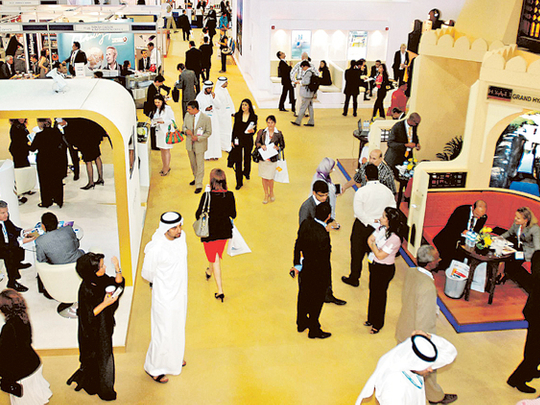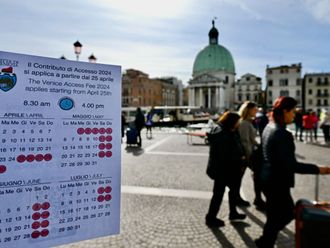
In the business travel market, the Meetings, Incentives, Conferences and Exhibitions (MICE) sector has, since 2009, grown much faster than traditional business travel. The key reason, according to an International Tourism Bourse (ITB) World Travel Trends Report, is substantial cuts in corporate travel spending.
“Over the first eight months of 2013, the MICE segment grew by six per cent while traditional business travel shrank by 10 per cent, the World Travel Monitor showed. The MICE segment now accounts for 54 per cent of the total business travel market. Within the MICE segment, incentives (+61 per cent), conventions (+44 per cent) and conferences (+27 per cent) have all grown strongly since 2009 on a cumulative basis while traditional company trips have declined by 10 per cent,” states the December 2013 ITB report.
The upswing in the sector has led organisers of The Gulf Incentives, Business, Travel and Meetings (GIBTM) taking place from March 24 to 26, to create a new initiative known as Business Travel @GIBTM. Designed to bring together the business travel community on one dedicated day, the focus is on corporate travel and a business travel knowledge programme, which features networking sessions, a regional trends report and panel discussions with industry leaders.
GIBTM is held at the Abu Dhabi National Exhibition Centre (Adnec) and organised by Reed Travel Exhibitions, which this year has 300 Middle Eastern and international hosted buyers attending (there were 251 hosted buyers in 2013).
Open platforms
Moderator at a panel discussion “Business Travel in the Middle East”, Chris Pouney, Director Business Travel, Severnside Consulting, believes the trend globally is a moving away from rigid corporate travel policies and adopting ‘open platforms’ that allow employees to decide for themselves what supplier or trip is most appropriate.
He considers this approach as a modern adaptation of a piece of management theory from a 1960’s paper by Douglas McGregor entitled The Human Side of Enterprise. Says Pouney, “In it he described two contrasting styles of workforce management and motivation — ‘theory X’ he says, described that staff must be coerced, controlled, directed, or threatened with punishment in order to get them to achieve the organisational objectives. This could be viewed as a traditional policy led approach to corporate travel management.”
“In contrast he described ‘theory Y’ as a management approach where staff exercise self-direction if they are committed to the objectives — this is open platform.”
Independent consultant Pouney believes the topic has polarised opinion among many travel buying procurement personnel and that corporate culture and appetite for risk play a part.
“Rather than trying new approaches amongst back office divisions at head office, I recommend that global companies try new approaches or technology in other markets, such as the UAE, where often adaptation of new technology is greater, plus multiple cultures and languages are present to truly test any new system or approach,” says Pouney.
The panel discussion takes place on Tuesday 25 March at 10am. Sunil Malhotra, Director, Aviation Sector Leader, Middle East and North Africa, Ernst and Young, will join the discussion and at 4pm Malhotra will present a discussion on the travel habits of business travellers in the GCC.
Pay attention
The IMEX Group’s predictions for the global meetings industry included the importance of technology, along with content, social corporate responsibility and the happiness factor. The growth in popularity of short, sharp video news clips indicates that attention spans of audiences are shorter than ever before and to expect meetings and event content to be delivered in more entertaining and digestible chunks.
“The attention span of our attendees is a big factor,” said conference moderator Glen Thayer at last year’s IMEX America in Las Vegas. “My tolerance for a YouTube video is 60 seconds and I’m done. That’s a big challenge…both at the physical live event and online.”
Another growing trend is for more organisations to embrace a work/life balance, recognising that employee loyalty and motivation hinges on a convergence of personal values with corporate ones. The IMEX Group also recognised that the future is not about having more technology, but rather how that technology is delivered.
Face-to-face meetings cannot be replaced by virtual meetings according to Pouney, but with videoconferencing being widely used in the corporate world people do not need to travel as much. “Rather than talk of ‘virtual’ eliminating travel, I prefer to examine how virtual can augment travelling, and ensure that projects are completed quicker, and to a better quality creating an enhanced ROI [return on investment] for the corporation.”
Talent pipelines
“The rise of virtual is especially interesting when considered as part of MICE. The ability to better interact with an audience, or extend the event communities to people who otherwise would not be part of it is very exciting, and creates amazing opportunities to increase the ROI of an event, plus help in building talent pipelines for the future,” he says.
While the Middle East has been a destination for some time, companies headquartered in the region are starting to grow their influence worldwide. “With this, comes a requirement for companies to manage business travel spend from this region, and not just for business arriving here,” he says.
“I am also seeing a lot more global organisations having travel management presence, and in some cases regional or global leaders based in this region. This will need this region to start thinking about business travel rather differently.”












